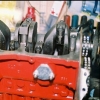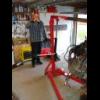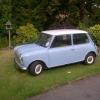I have just managed to get the last stud out from the thermostat housing on my 1966 Riley Elf Mk2 (after a week of twisting and "Plus-gassing").
Should I now clean out the bolt holes with a thread chaser or a tap or am I being too fussy? As the 5/16" UNC hole is 1" deep and the stud insertion length is only 5/8" long, I presume I could clean it by screwing a 5/16" UNC bolt into the hole which would push any dirt to the bottom.
Also, I have read that a tap tends to reduce the thread in the hole whereas a chaser is less damaging - but I would need to buy these of course.
Finally, would you recommend copper grease or similar for the re-assembly using new stainless steel studs or bolts?
I would be glad to receive any comments. Thanks.



















